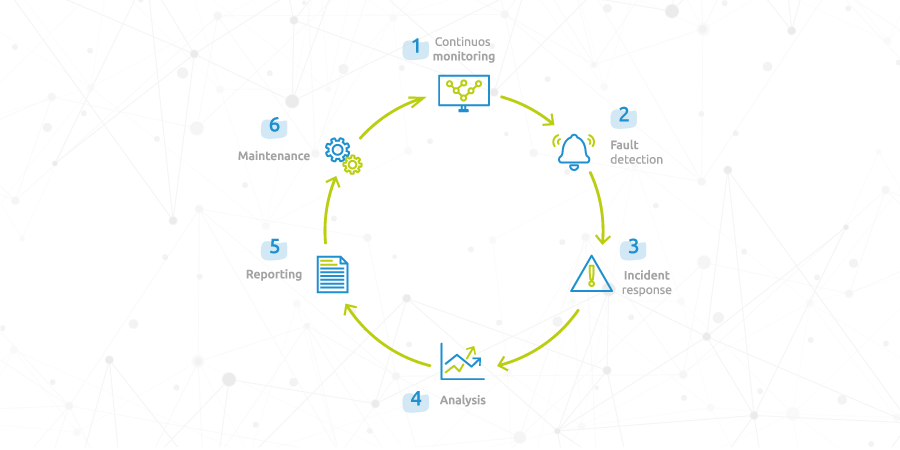16 Sep 2021
- Last update on 23 Oct 2025
A Network Operation Center, aka NOC, is an area in charge of monitoring 24x7x365 the activity, performance and health of a network infrastructure. It includes such things as alarm monitoring, fault detection, root cause identification and analysis, troubleshooting, support, configuration and maintenance, among other activities.
Unquestionably NOC is an area that ensures network availability, protects and maintains the network against downtimes and outages, assuring the proper functioning of the infrastructure.
Understanding how a NOC works. What does a network operations center really do?
The complexity of network management depends on the infrastructure to be monitored and its characteristics. The larger the network, the more complex it is.
This diagram makes understanding the concept of NOC team work easy:

Network Operation Center Best Practices that need to be on your radar right now
Continuous monitoring & fault detection
The NOC team is responsible for ensuring that the network is running at its best. Therefore, a Network Operation Center monitors network faults, in order to detect issues as soon as they occur and troubleshoot them rapidly. Here are several things that it does:
- Alarm and event monitoring. This requires an accurate event and alarm categorisation according to their severity. Also, the utilisation of a good notification system is essential to be able to notify any issue that requires the action of a field services team.
- Alert classification. There is a real need to classify alerts received to prioritise critical issues. Also, there are numerous repetitive alerts that can be reported and improve the efficiency of your team.
- Monitoring data traffic to ensure accurate performance and optimisation.
- User experience and QoS monitoring (QoS means the quality of a service delivered to the customer).
- Performance monitoring. Ensuring network availability is also of utmost importance. Here a Business Continuity Plan comes into play, which can not be compromised.
- Power monitoring, in case of a system failure, it is necessary to guarantee backup systems supply.
Incident response
Fixing issues quickly minimises costly downtime and avoids outages. That’s why fast troubleshooting is essential to operations whenever a fault is detected.
For a fast and effective incident response it is necessary to define how to proceed in different situations. Therefore, your network engineers always know what steps they need to follow to fix problems within the shortest possible time.
Analysis & reporting
- Network behaviour analysis, including information about events, alarms, deviations, configuration changes…
- Troubleshooting and incident response activities. It is critical to know the way issues were fixed to define improvements to be implemented.
- Complete reporting covering aspects to improve the infrastructure and systems available in a network.
- Network inventory. Here it is necessary to include information about circuits per department and/or per price, cards, spare parts and stock available to replace old equipment or the failed ones.
- Business Intelligence tools are a big plus. Usually, companies invest in a separate business intelligence tool. We advise you to use a NMS with BI capabilities incorporated already, allowing you to reduce costs.
Configuration & maintenance
Assuring that the network is running properly and guaranteeing good conditions in order to meet business continuity goals are fundamental aspects of NOCs.
Maintaining the infrastructure configured and updated is key. Your network must run smoothly, circuits must be configured and traced correctly, and each device installed, updated, and configured in a correct way.
Supervision and maintenance
- HW and SW setup and implementation
- HW and SW updates, taking care of outdated equipment, firmware’s management…
- Backup and storage management.
- Patch management.
- Testing (script execution, configuration comparison, connections, etc.)
- Using MIB Browser and MIB Compiler allows your team to manage all the devices.
If you are designing a NOC from zero
- Determine roles and professionals involved. Assign responsibilities for each area.
- Inventory of tools and systems is required, not only of current ones but also new ones, such as spare parts.
- Help desk ticketing system is utmost importance.
- Reports generation and other relevant documentation.
- Incident traceability determining root cause and correlation.
- Establishing processes, policies, and rules to figure out any issue that might occur.
What are the challenges facing Network Operation Centers (NOC) in 2023?
Network Operations Centers (NOCs) are facing some significant challenges that require attention. Here are the top challenges NOCs will need to overcome in this 2023:
Keeping up with new technologies
As technology continues to advance at a rapid pace, NOCs must keep pace with new tools and platforms to keep up with changing network requirements. This can be a daunting task, requiring significant time and resources to ensure that teams are properly trained and equipped to handle new technologies.
Managing the complexity of network
The increasing complexity of networks can lead to greater operational challenges for NOC teams, including troubleshooting, monitoring, and resolving issues that arise across a variety of devices and systems. NOCs must be equipped with the latest network management strategies to stay ahead of potential issues.
Ensuring network security
Cybersecurity threats continue to grow, and NOCs must be equipped with the latest security tools and technologies to detect, prevent, and respond to cyber threats before they can do harm. NOCs must also be vigilant in their approach to network security, constantly evaluating and updating their protocols to stay ahead of emerging threats.
Managing the impact of new regulations
New regulations and compliance requirements can create additional challenges for NOCs, particularly in industries like healthcare and finance. NOCs must be equipped to meet these new requirements, while also maintaining network performance and uptime.
Attracting and retaining talent
As the demand for skilled IT professionals continues to grow, NOCs must compete with other organizations to attract and retain the talent they need. NOCs must have a strong employee value proposition to attract and retain top talent in a competitive job market.
To conclude, digitalisation drives growth for infrastructures, incorporating multiple devices, technologies and systems making it more difficult to understand, to control and to get a complete view of the entire network.
NOC is a complex area that requires a comprehensive tool to manage the network in the smartest way possible. Our NMS is already used by NOCs worldwide, moreover within critical infrastructures. Our system helps our clients effectively monitor issues, performance, security, as well as giving them incorporated BI to deliver the most exhaustive reports and dashboards.
